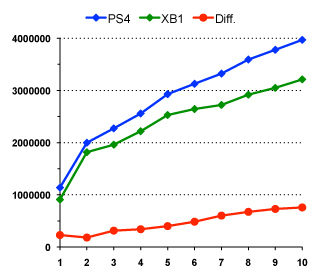I'm not sure what that has to do with whether focus strategies are viable as a generality. Or even in this instance whether focus strategies are viable. That there's two competitors targeting the same market simply means that one will presumably out-compete the other for that focus market. If you're arguing what Opiate is below, that's another matter, but it doesn't seem particularly clear.
I'm partially arguing what Opiate was; its one of the three generics, and as generics they are not applicable to all markets at all times - for example a pricing strategy does not work with Veblen goods.
A focus strategy inherently assumes both a growing market and an unexploited niche within it to target, usually at a premium price point, as by focussing on the niche you must rely more on individual sales rather than volume.
Applying this condition to gaming, and for this strategy to make sense, you must infer that console gaming is and of itself a niche of gaming in general, and that your sales targets will therefore pay a premium for this focus, where the 'general public' in the industry will not.
The problem is that console gaming is not the high end enthusiast niche - that remains the domain of PC gaming - and that the targetted potential audience are willing to pay higher prices for their products accordingly, which historically has never been the case, either for hardware or software.
Console gamers have historically been shown to be extremely price sensitive to even small price discrepancies to their perceived norm - see the backlash on the PS3 launch pricing, or attempts by publishers to stifle the second hand market with things like Project $10.

